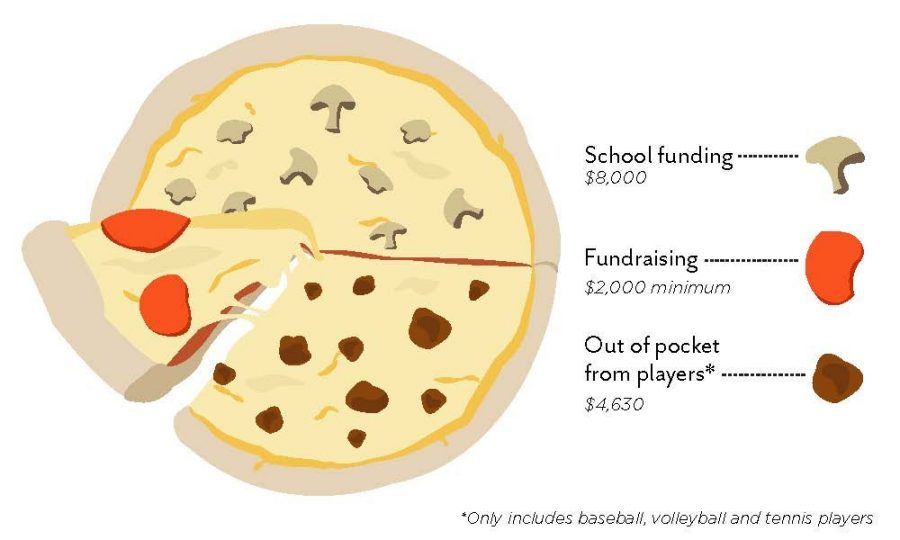Not all funds and games
October 6, 2014
Despite the college allocating $8,000 to the Renegades for its yearly budget, student athletes still have to pay large fees out-of-pocket to keep the teams operating.
The tennis, baseball and volleyball teams generate a combined $4,630 in league dues, which is used to cover the expenses for events that the Renegades host as well as jerseys and travel, according to the Renegades team captains.
Renegades President Mike Sempek said to best distribute the funds it receives from Columbia, the Renegades have implemented a new three-tiered policy. Tier one teams receive $2,000, tier two teams receive $1,000 and tier three teams receive $500 per year. Tier one teams, such as baseball, receive more because they travel more than 50 miles and play competitively, according to Sempek.
“[Tier one teams] receive [the most money] because, for instance, our baseball team, they go to Notre Dame next semester, they have more players [and] more equipment,” Sempek said. “It makes sense for them to get more money because they use it. Whereas our Poms team is [Tier] three and they only get $500 a year because all they do is perform at in-school events.”
The Renegades have added two new teams, Quidditch and Galahad, for the 2014–2015 year but have not seen a funding increase from last year. Sempek said it presents a tough challenge when the organization grows but the budget does not.
“The $8,000 [we receive] is what we have to use for all of the events that we put on as well as what we give to the teams,” Sempek said. “We kind of have to make it stretch, and that’s what’s difficult. We’re getting more teams this year, more than we’ve ever had. There [are] more teams that want money and there’s less money to give out.”
As the Renegades continue to struggle with funding, teams are fundraising to make up the difference. The Renegades treasurer is responsible for raising at least $2,000 through fundraising as part of his duties, according to Sempek. On Oct. 1, the Renegades teamed up with Lou Malnati’s, a popular Chicago pizzeria chain, to raise funds. The restaurant donated 20 percent of all the purchases made by customers who brought in a Renegades fundraiser flyer.
Aldo Guzman, director of Student Activities & Leadership, said funding for the Renegades is based on enrollment.
“Enrollment determines [our funding],” Guzman said. “Our funding comes in from the student activity fee, so based on what our enrollment numbers are, we as an office decide our budget.”
Guzman said while his office does not do any fundraising for any student organization, the Renegades do have an office advisor.
“[Each organization] has a faculty staff advisor who works with them [and] meets with them on a weekly basis,” Guzman said. “Together they figure out what they can do for fundraising. We are happy to bounce thoughts back and forth. We will send them some leads if we know of any companies who like to do fundraising.”
Renegades Vice President Scott Wilson, who is also on the baseball team, said that while the league dues and funding are helpful, they do not cover other expenses that athletes or teams may encounter, such as equipment. On the Dick’s Sporting Goods website, a baseball glove ranges in price from $39.99–$500 depending on the brand and material of the glove.
Corbin Merriman, captain of the Renegades baseball team, echoed similar sentiments. Merriman said the team and its players are responsible for quite a bit financially.
“As far as [baseball] gloves, each kid is responsible to have their own,” Merriman said. “The same [goes] with belts and pants and cleats. The bats are completely up to them as well.”
Guzman said when the budget for his office is cut, they try to find other areas when they can make cuts before considering cutting the funding for a student organization.
“Some of the expenses that we have for our operations—whether it be equipment or supplies or furniture—sometimes we will put those purchases on hold so that the [student] organizations don’t get affected as much,” Guzman said.
Guzman also said if there is an increase in teams playing competitively and not just club teams playing on campus, there can be an open discussion about the possibility of a funding increase for the Renegades.
“If we have organizations who are actually competing and that number gets increased, we as an office have looked back at that,” Guzman said. “We can make adjustments to provide support for them as well. It’s just that they haven’t been organized to that level yet because students are not stepping up in those [leadership] roles.”








